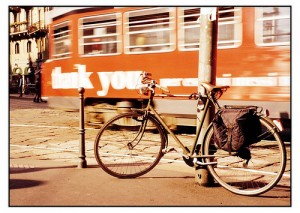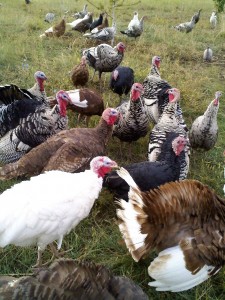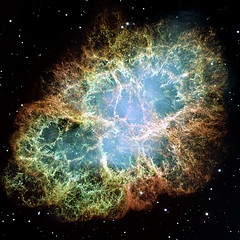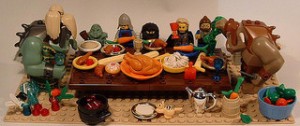An estimated 73 percent of the People of LWON will be in a country that celebrates Thanksgiving today, and the remaining 27 percent are good-natured sorts, so we decided to dedicate today’s post to giving thanks. We’re writing about what we’re thankful for—and what gratitude says about us, about life on earth, about what we expect or about what we hope will be.
We’d love to hear if there’s someone or something you’re thinking about today, or your take on gratitude and its place in a complicated world. But first, we wanted to give a shout-out to someone we’re all grateful to—thank you, dear reader, to you.
Jessa
The abstract expression of gratitude goes a bit against my atheist sensibilities, because it implies some kind of entity to thank. But I do marvel at the regularity with which, at the end of the day, I am convinced that very few other people in the world could possibly experience the variety of life events that seem to happen to me. I know it’s highly subjective, and I can tell it’s an illusion because it’s much more frequent when I happen to be in an urban setting, where the random interactions and harmonics of social play lead to extreme outcomes, but I “feel lucky” nonetheless. In short, I’m thankful for adventure.
Ann
Ah, Jessa. She’s making me think. She’s right, feeling thankful does imply some entity to be thanked. And since I share her atheist sensibilities, who/what am I thanking? Given the range and frequency of life’s vicissitudes (the most recent, two cousins in Washington, IL, who have the clothes on their backs, a few things, and a generous sister/mother, and that’s it, period), I’m most thankful that things aren’t worse. Though things could be and still might. So the entity I’m thanking, I guess, is that same luck Jessa thanks. But since the luck usually comes in the form of other people — mothers and sisters, friends and relatives and neighbors and colleagues, and communities large and small — it’s hardly luck at all. It’s done on purpose right in the face of the vicissitudes. And I’m thankful for it.
Christie

Thanksgiving is the only holiday I truly love. I like that its rituals center around the harvest’s bounty and carefully prepared sustenance, and that it involves no cheesy Hallmark cards, plastic decorations or obligatory gift-giving. But most of all, I love that Thanksgiving is a celebration of gratitude, a most beautiful, life-affirming emotion.
I disagree with Jessa that gratitude requires some sort of higher entity to thank. Thankfulness is a marvelous feeling, even when it’s directed at an uncaring universe. Gratitude is a ritual for embracing life’s joys. It’s a declaration of meaning in a world that doesn’t care. There’s so little I can do about the injustices I see so often in my work, but I can choose to relish life’s beauty too. This Thanksgiving, I’m grateful for family and friends who’ve given me a home in this vast, beautiful, indifferent universe.
I’m not particularly religious but when exposed to so many atheists I tend to drift back to my highly religious childhood. It’s my pugnacious nature. Thanksgiving is actually a big holiday for Christian Scientists and growing up, we always went to church that day. I think it’s the fact that to give gratitude to a higher power – be it man or God – is deeply humble and transformative experience. I love Thanksgiving more than any other holiday. It looks back and yet forward. We are thankful for the safety and love we have seen throughout the year. Yet, since that first Thanksgiving, it’s been a day filled with hope for the future. With sharing. And while I haven’t been to church in more than a decade, I still feel a deep reverence for that day. That day when we look across a table at a strange person with strange markings from a strange land and say, “Maybe tomorrow we’ll finally abandon the hatred and violence of yesterday.” It didn’t pan out that first time but here’s hoping for the next.
Cameron
I’m with Christie and Erik —Thanksgiving is my favorite holiday. For me, gratitude gives the world its color and texture and bittersweet wonderful terrible awesomeness, in the original sense of the word, not in the way I just said it to the barista who gave me my tea. Although it was delicious—mint, and in a white ceramic cup with a saucer, which makes it taste so much better.
So I’m grateful for rain, which is in the forecast for Thanksgiving at my mother-in-law’s house. It helps plants and trees and neglected gardens grow, encourages time inside with family and friends and wine and food, and also inspires gleeful splashing and running—which sometimes makes me feel like I’m at an epic, uplifting high school football practice, and afterwards we’ll all be teammates for life. Thanks to all those people running in the rain beside me, in person or in spirit, who also put up with my terrible grammar.
Michelle
For me, Thanksgiving is an exercise in recalibration. As journalists, part of our job is to witness suffering—acute and chronic, past and present, and so, so often frustratingly avoidable. I happened to do a lot of witnessing this past year, and it left me humbled and sad and deeply pissed off. And while sadness and anger are pretty good motivators, love is a better one; it lasts longer, and hurts less. So I see Thanksgiving, especially this Thanksgiving, as a chance to notice all the things I love, and realize how many of them there are—the people, the places, the books (oh, the books), and all the little bits of genius around us. I’m grateful not to any particular entity but to the combination of luck and effort and generosity that creates beauty in the world, beauty that can bloom and endure right next to the worst our species comes up with.
Roberta
A few months ago, I saw a cheesy article called “6 Simple Rituals to Reach Your Potential Every Day.” Of course, I clicked on it. One of the tips: Write down five things you’re grateful for every morning. Since I obviously wasn’t reaching my potential, I started following that advice (well, three things per morning — I usually run out of steam after that). I scribble them on a whiteboard in our hallway, and sometimes my husband adds to the list. So far I’ve expressed thanks for things like our apartment, the pretty morning sky, the chicken and potatoes in the fridge, my parents’ health, the French restaurant in our neighbourhood, and a recent dinner with a friend. I’m still not reaching my potential, but I think this little ritual helps me realize that it doesn’t really matter.
Sally
I’m grateful for nothing. That’s always a dicey opener. I’m not saying I am not grateful for anything. It’s that I’m very grateful for what we think of as “nothing.”
 I’m a committed member of the church of Militant Agnosticism (motto: “I don’t know and neither do you”). But whatever your epistemological bent — whether you know there’s a God, know there’s no God, or hang out on the fence — you and I and the next guy, we all shatter into the same little pieces when a beloved dog dies, or a grandmother, or an old friend whom you hadn’t seen in too long but who you never expected to just up and die at this age. Suddenly there’s the void staring you in the eye licking its chops. I used to be afraid of the void, the nothing, because I thought it was obscene and absurd and diminishing. Then I started looking into physics and learned that nothing isn’t what you think it is. It’s not empty space because there’s no such thing. Even the remotest vacuum between distant stars is filled with particles and dust and laws governing their motion and gravity and time and magnetism and spooky action at a distance. The barest place in the universe is teeming. Nothing? There’s no such thing. For a physicist, nothing is as inconceivable as God is for a militant agnostic.
I’m a committed member of the church of Militant Agnosticism (motto: “I don’t know and neither do you”). But whatever your epistemological bent — whether you know there’s a God, know there’s no God, or hang out on the fence — you and I and the next guy, we all shatter into the same little pieces when a beloved dog dies, or a grandmother, or an old friend whom you hadn’t seen in too long but who you never expected to just up and die at this age. Suddenly there’s the void staring you in the eye licking its chops. I used to be afraid of the void, the nothing, because I thought it was obscene and absurd and diminishing. Then I started looking into physics and learned that nothing isn’t what you think it is. It’s not empty space because there’s no such thing. Even the remotest vacuum between distant stars is filled with particles and dust and laws governing their motion and gravity and time and magnetism and spooky action at a distance. The barest place in the universe is teeming. Nothing? There’s no such thing. For a physicist, nothing is as inconceivable as God is for a militant agnostic.
So what is nothing, then, if it doesn’t exist anywhere in the universe? The most compelling definition I’ve seen comes from the origin myths shared by most cultures around the world. They hold that the universe was born from a primal nothingness, a galactic absence. This idea of “nothing” — far from what its cold, empty reputation suggests — is a hot, vital and fertile ground swarming with possibility. And the universe it conceived comforts us with its guide stars and signposts. Standard candles — my favourite term — are supernovae that burn so steady and bright we can count on them to calibrate unthinkable distances and gauge yawning chasms back in time. On brown dwarfs the raindrops are molten iron and the snows pile up in silicate drifts. We look across ridiculous distances to find signs of life on exoplanets, secure that we can trust our measurements because of spectroscopy. These are not abstractions. These are hints that maybe some freaked-out agnostic is standing on another distant pale blue dot, terrified by the weight of nothing, pulled back from the brink by one standard candle.
Cassandra
In February my stepmom was diagnosed with advanced ovarian cancer, a disease with an awful prognosis. But instead of falling apart, my family managed to adapt. My stepmom learned how to tie headscarves and my dad learned to sleep in a hospital chair. A science journalist to the core, I researched treatment regimens and wondered about the value of a second opinion. I learned to give injections and sponge baths. I remembered to drive very very slowly over the bumpy roads that could cause her so much pain.
Two surgeries and six rounds of chemo later, my stepmom is free of cancer. She’s sporting a pixie cut and shoveling snow. So this year I’m especially grateful for modern medicine. Thank you, oncology. Gracias cisplatin and paclitaxel. Merci bevacizumab. Keep up the good work.
Richard
 When I think about thanks, I don’t think about what or whom I’m thanking. The feeling is more a sense of general gratitude, even relief; it’s a reminder to myself to be aware of what’s good. Lately that feeling has been centering on a little ritual I occasionally perform. I go to a local pub, order a pint of lager, and curl up with a short story by William Trevor. One of his volumes of collected stories has 60, the other has 48, so opening one of those books to a new story feels to me a little like life: Eventually I’ll run out of William Trevor stories, but for now the bounty seems sufficient. Of course, the bounty becomes less plentiful with every pint, and so, perhaps, each story becomes more poignant. But no matter: This ritual is not about what’s to come. It’s not about what’s been done. It’s not about deadlines or dread or hope or regrets. I write a lot about astronomy and cosmology, so I think about space and time while on the job, and the same is true at the pub of an evening: here and now.
When I think about thanks, I don’t think about what or whom I’m thanking. The feeling is more a sense of general gratitude, even relief; it’s a reminder to myself to be aware of what’s good. Lately that feeling has been centering on a little ritual I occasionally perform. I go to a local pub, order a pint of lager, and curl up with a short story by William Trevor. One of his volumes of collected stories has 60, the other has 48, so opening one of those books to a new story feels to me a little like life: Eventually I’ll run out of William Trevor stories, but for now the bounty seems sufficient. Of course, the bounty becomes less plentiful with every pint, and so, perhaps, each story becomes more poignant. But no matter: This ritual is not about what’s to come. It’s not about what’s been done. It’s not about deadlines or dread or hope or regrets. I write a lot about astronomy and cosmology, so I think about space and time while on the job, and the same is true at the pub of an evening: here and now.
Helen
I’m glad you’ve all established already that belief in a supreme being is not required for feeling thankful. I am full of thanks, and I spread my gloopy thanks all around. I am thankful to my parents. I am thankful to my friends and acquaintances and the people who have given me work and the people who agree to talk to me so I can do my work and, oh, I am really and truly grateful to anyone who reads my work. I am thankful to Leonard Bernstein and U2 and Johann Sebastian Bach.
Come to think of it, I’m thankful to the entire history of humanity for inventing the wonderful things I love, like knitting and bacon, and to our primate and mammalian and slime ancestors for keeping the reproduction and evolution going. I’m thankful to the sky for dropping snow and rain and to the universe for giving me sunsets and planets and stars.
Thanks, world!
**
Images from Flickr users screanzatopo (bike), marthachapa_95 (toys), carolyn_sewell (thank you), NASA Goddard Space Flight Center (Crab Nebula), apolinar fonesca (beer) under Creative Commons license.

What a lovely blog entry to read. Thank you all for it!
I can imagine sitting around a thanksgiving day table with this crew would be a lot of fun!
You should do these little conversationals more often. This was thoughtful and sweet and funny.